Arguments Against Capital Punishment: A Call for Abolition
VerifiedAdded on 2023/03/30
|13
|2828
|389
Essay
AI Summary
This essay argues for the abolition of capital punishment, presenting several key arguments against it. The author contends that capital punishment does not lead to a decline in crime rates, risks the lives of innocent people due to flaws in the criminal justice system, and is excessively costly. The essay explores the execution of innocent individuals, the moral issues surrounding retribution, and the violation of the right to life. It also examines the failure of capital punishment to deter crime, the brutality inherent in the practice, and the potential for brutalization within society. The essay cites various sources to support its claims, including studies on the deterrence effect and arguments from legal and ethical perspectives. The author concludes that capital punishment should be eradicated due to its ineffectiveness and ethical shortcomings.
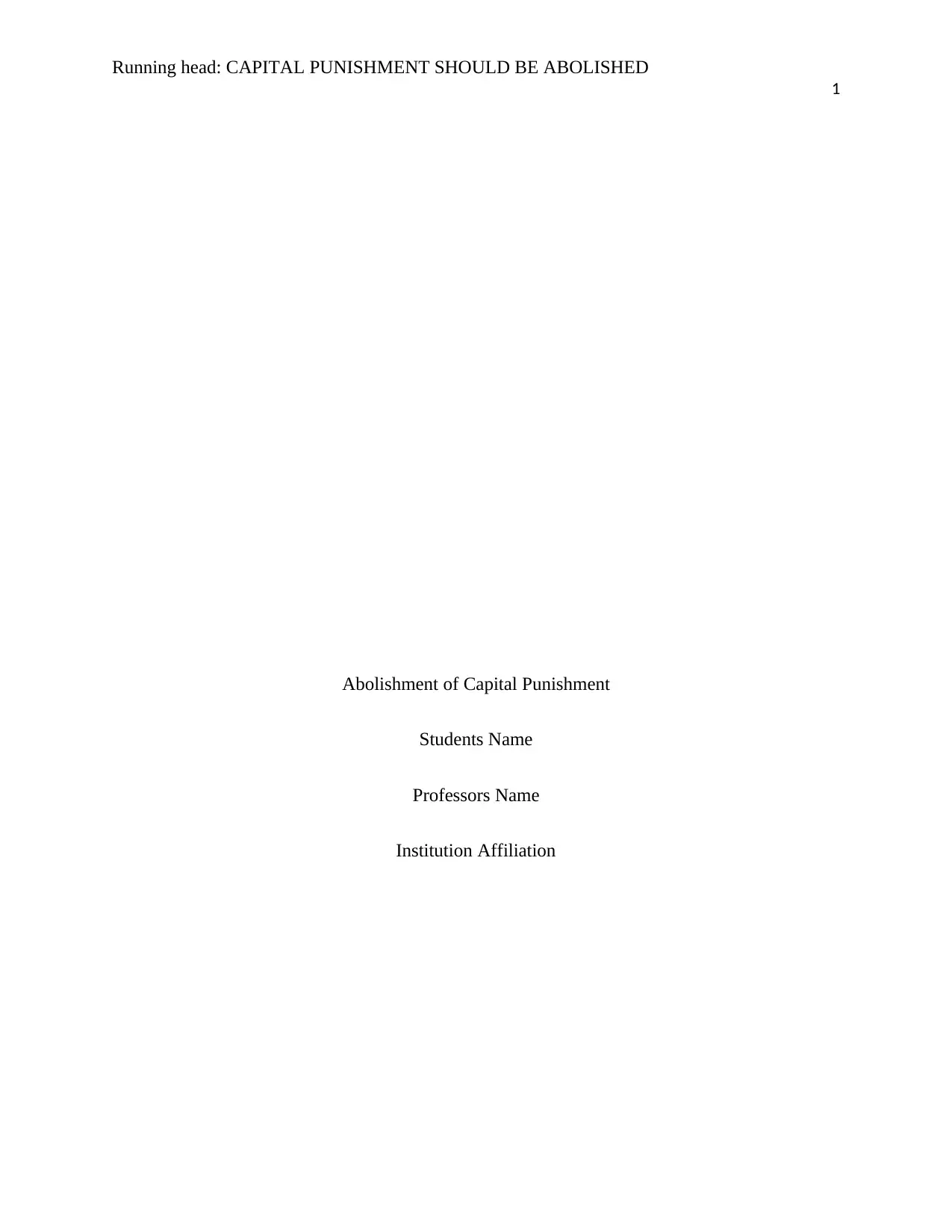
Running head: CAPITAL PUNISHMENT SHOULD BE ABOLISHED
1
Abolishment of Capital Punishment
Students Name
Professors Name
Institution Affiliation
1
Abolishment of Capital Punishment
Students Name
Professors Name
Institution Affiliation
Paraphrase This Document
Need a fresh take? Get an instant paraphrase of this document with our AI Paraphraser
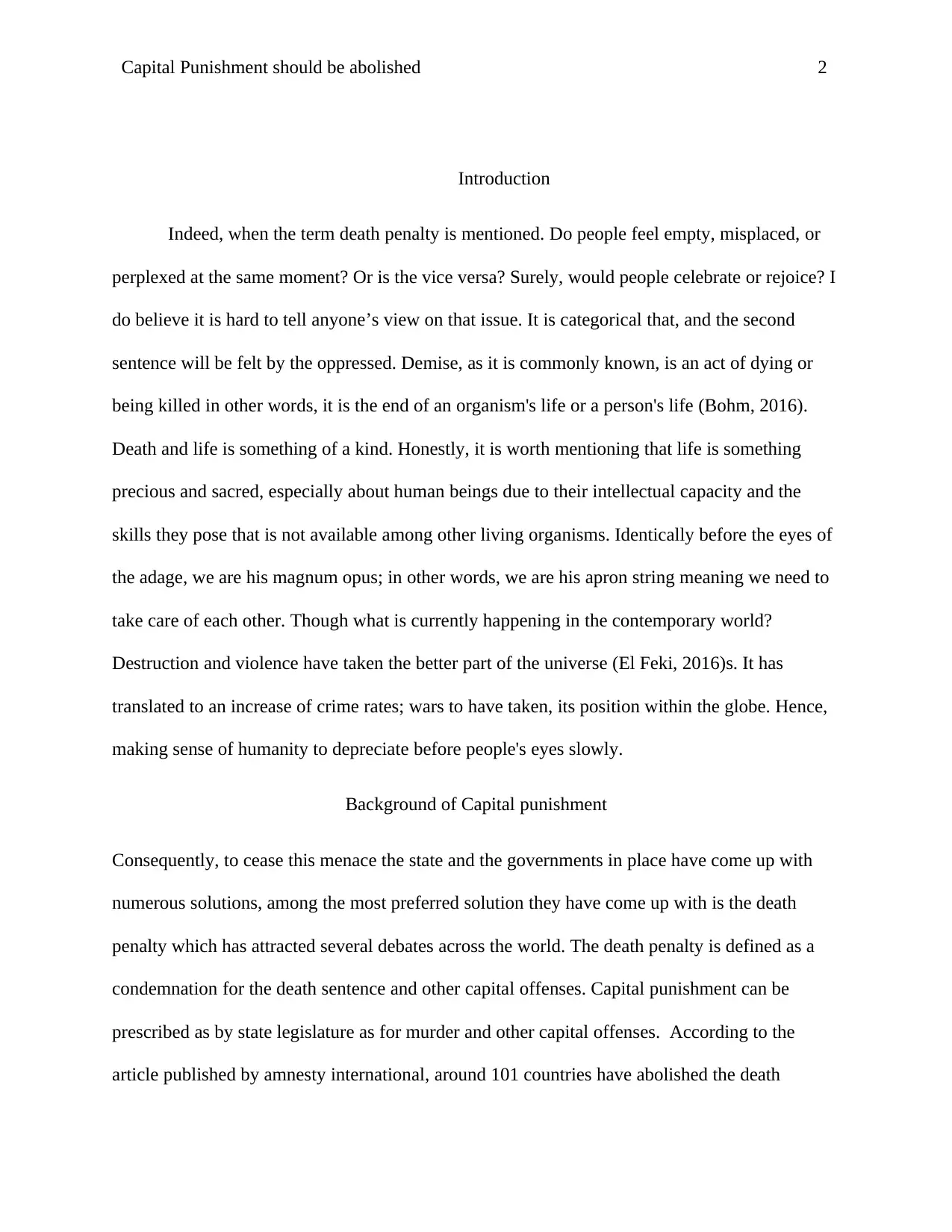
Capital Punishment should be abolished 2
Introduction
Indeed, when the term death penalty is mentioned. Do people feel empty, misplaced, or
perplexed at the same moment? Or is the vice versa? Surely, would people celebrate or rejoice? I
do believe it is hard to tell anyone’s view on that issue. It is categorical that, and the second
sentence will be felt by the oppressed. Demise, as it is commonly known, is an act of dying or
being killed in other words, it is the end of an organism's life or a person's life (Bohm, 2016).
Death and life is something of a kind. Honestly, it is worth mentioning that life is something
precious and sacred, especially about human beings due to their intellectual capacity and the
skills they pose that is not available among other living organisms. Identically before the eyes of
the adage, we are his magnum opus; in other words, we are his apron string meaning we need to
take care of each other. Though what is currently happening in the contemporary world?
Destruction and violence have taken the better part of the universe (El Feki, 2016)s. It has
translated to an increase of crime rates; wars to have taken, its position within the globe. Hence,
making sense of humanity to depreciate before people's eyes slowly.
Background of Capital punishment
Consequently, to cease this menace the state and the governments in place have come up with
numerous solutions, among the most preferred solution they have come up with is the death
penalty which has attracted several debates across the world. The death penalty is defined as a
condemnation for the death sentence and other capital offenses. Capital punishment can be
prescribed as by state legislature as for murder and other capital offenses. According to the
article published by amnesty international, around 101 countries have abolished the death
Introduction
Indeed, when the term death penalty is mentioned. Do people feel empty, misplaced, or
perplexed at the same moment? Or is the vice versa? Surely, would people celebrate or rejoice? I
do believe it is hard to tell anyone’s view on that issue. It is categorical that, and the second
sentence will be felt by the oppressed. Demise, as it is commonly known, is an act of dying or
being killed in other words, it is the end of an organism's life or a person's life (Bohm, 2016).
Death and life is something of a kind. Honestly, it is worth mentioning that life is something
precious and sacred, especially about human beings due to their intellectual capacity and the
skills they pose that is not available among other living organisms. Identically before the eyes of
the adage, we are his magnum opus; in other words, we are his apron string meaning we need to
take care of each other. Though what is currently happening in the contemporary world?
Destruction and violence have taken the better part of the universe (El Feki, 2016)s. It has
translated to an increase of crime rates; wars to have taken, its position within the globe. Hence,
making sense of humanity to depreciate before people's eyes slowly.
Background of Capital punishment
Consequently, to cease this menace the state and the governments in place have come up with
numerous solutions, among the most preferred solution they have come up with is the death
penalty which has attracted several debates across the world. The death penalty is defined as a
condemnation for the death sentence and other capital offenses. Capital punishment can be
prescribed as by state legislature as for murder and other capital offenses. According to the
article published by amnesty international, around 101 countries have abolished the death
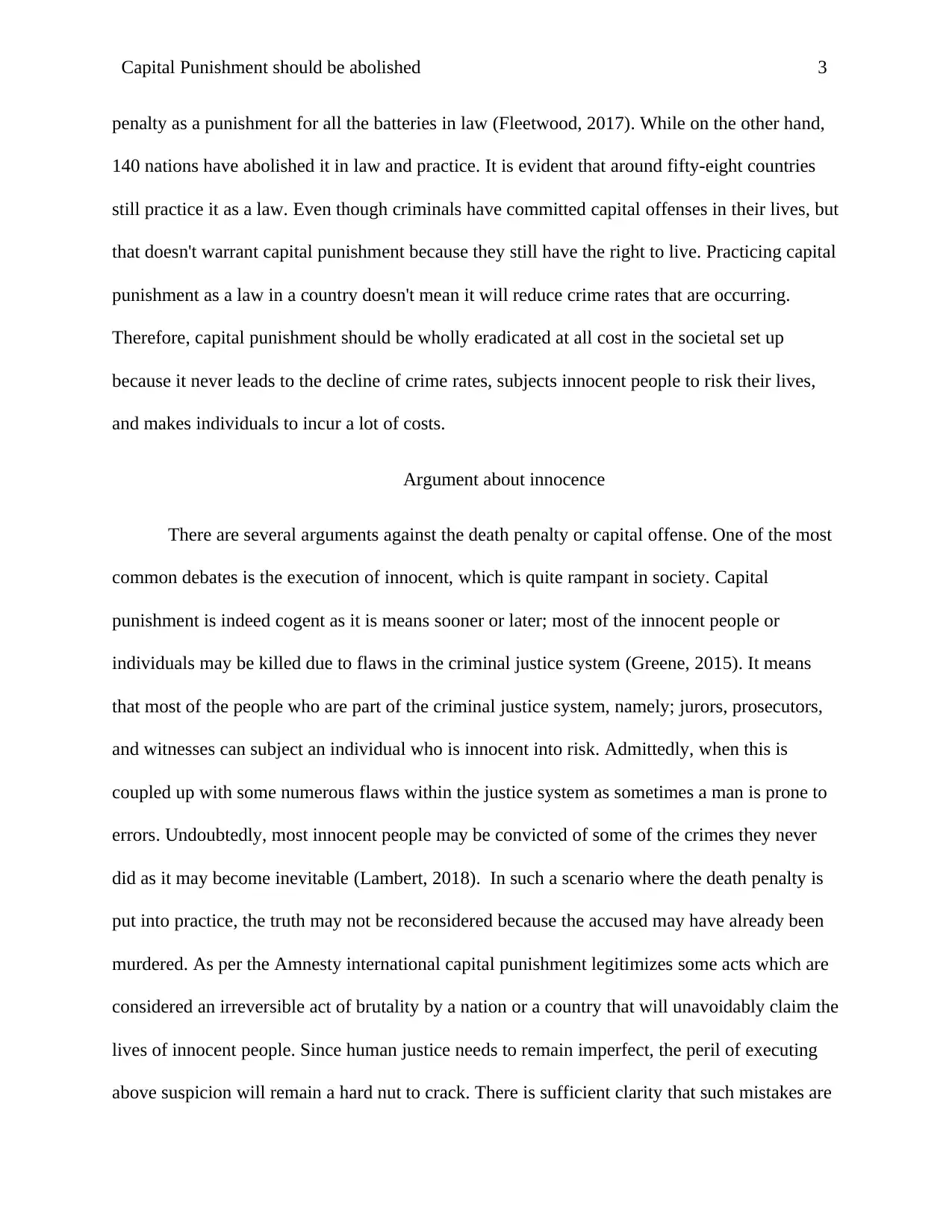
Capital Punishment should be abolished 3
penalty as a punishment for all the batteries in law (Fleetwood, 2017). While on the other hand,
140 nations have abolished it in law and practice. It is evident that around fifty-eight countries
still practice it as a law. Even though criminals have committed capital offenses in their lives, but
that doesn't warrant capital punishment because they still have the right to live. Practicing capital
punishment as a law in a country doesn't mean it will reduce crime rates that are occurring.
Therefore, capital punishment should be wholly eradicated at all cost in the societal set up
because it never leads to the decline of crime rates, subjects innocent people to risk their lives,
and makes individuals to incur a lot of costs.
Argument about innocence
There are several arguments against the death penalty or capital offense. One of the most
common debates is the execution of innocent, which is quite rampant in society. Capital
punishment is indeed cogent as it is means sooner or later; most of the innocent people or
individuals may be killed due to flaws in the criminal justice system (Greene, 2015). It means
that most of the people who are part of the criminal justice system, namely; jurors, prosecutors,
and witnesses can subject an individual who is innocent into risk. Admittedly, when this is
coupled up with some numerous flaws within the justice system as sometimes a man is prone to
errors. Undoubtedly, most innocent people may be convicted of some of the crimes they never
did as it may become inevitable (Lambert, 2018). In such a scenario where the death penalty is
put into practice, the truth may not be reconsidered because the accused may have already been
murdered. As per the Amnesty international capital punishment legitimizes some acts which are
considered an irreversible act of brutality by a nation or a country that will unavoidably claim the
lives of innocent people. Since human justice needs to remain imperfect, the peril of executing
above suspicion will remain a hard nut to crack. There is sufficient clarity that such mistakes are
penalty as a punishment for all the batteries in law (Fleetwood, 2017). While on the other hand,
140 nations have abolished it in law and practice. It is evident that around fifty-eight countries
still practice it as a law. Even though criminals have committed capital offenses in their lives, but
that doesn't warrant capital punishment because they still have the right to live. Practicing capital
punishment as a law in a country doesn't mean it will reduce crime rates that are occurring.
Therefore, capital punishment should be wholly eradicated at all cost in the societal set up
because it never leads to the decline of crime rates, subjects innocent people to risk their lives,
and makes individuals to incur a lot of costs.
Argument about innocence
There are several arguments against the death penalty or capital offense. One of the most
common debates is the execution of innocent, which is quite rampant in society. Capital
punishment is indeed cogent as it is means sooner or later; most of the innocent people or
individuals may be killed due to flaws in the criminal justice system (Greene, 2015). It means
that most of the people who are part of the criminal justice system, namely; jurors, prosecutors,
and witnesses can subject an individual who is innocent into risk. Admittedly, when this is
coupled up with some numerous flaws within the justice system as sometimes a man is prone to
errors. Undoubtedly, most innocent people may be convicted of some of the crimes they never
did as it may become inevitable (Lambert, 2018). In such a scenario where the death penalty is
put into practice, the truth may not be reconsidered because the accused may have already been
murdered. As per the Amnesty international capital punishment legitimizes some acts which are
considered an irreversible act of brutality by a nation or a country that will unavoidably claim the
lives of innocent people. Since human justice needs to remain imperfect, the peril of executing
above suspicion will remain a hard nut to crack. There is sufficient clarity that such mistakes are
⊘ This is a preview!⊘
Do you want full access?
Subscribe today to unlock all pages.

Trusted by 1+ million students worldwide
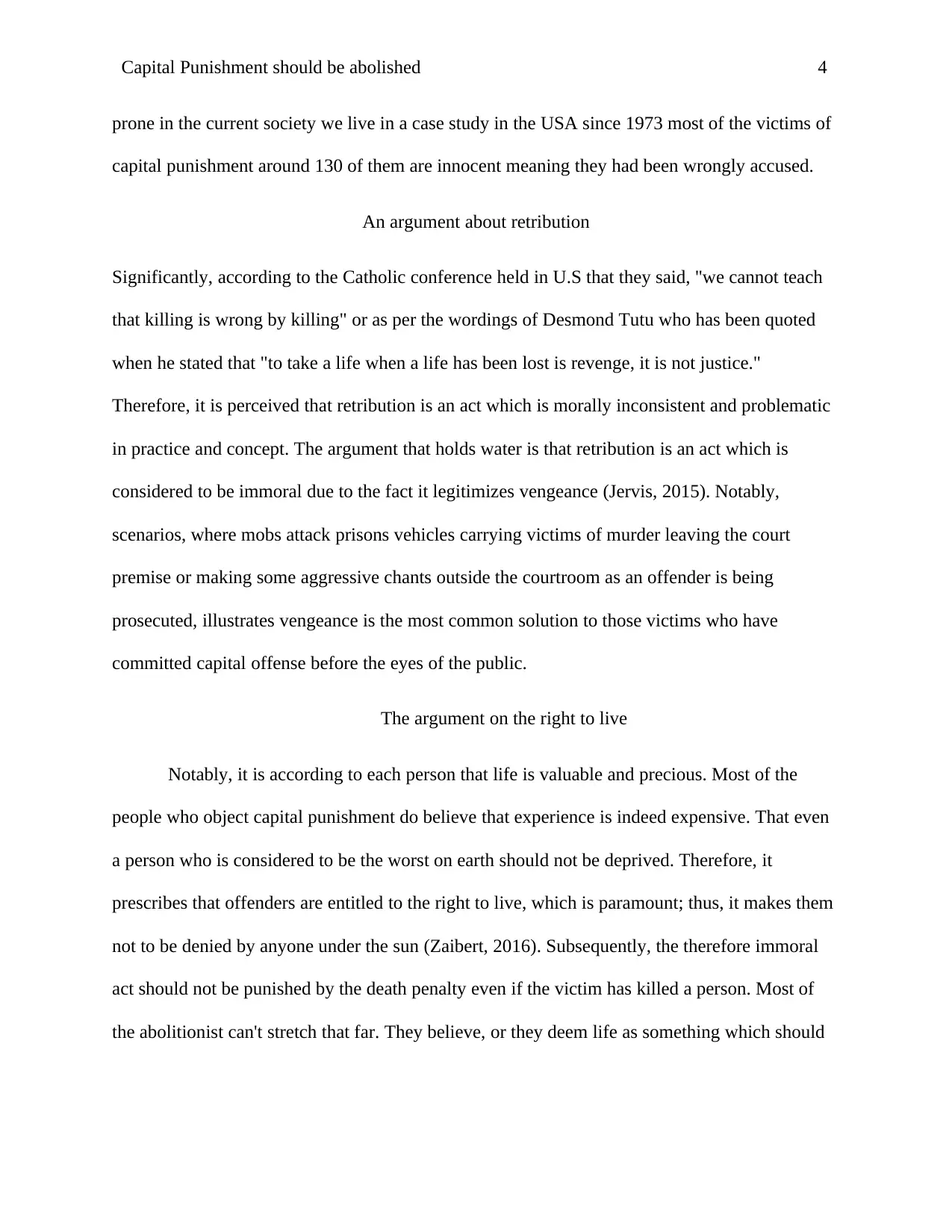
Capital Punishment should be abolished 4
prone in the current society we live in a case study in the USA since 1973 most of the victims of
capital punishment around 130 of them are innocent meaning they had been wrongly accused.
An argument about retribution
Significantly, according to the Catholic conference held in U.S that they said, "we cannot teach
that killing is wrong by killing" or as per the wordings of Desmond Tutu who has been quoted
when he stated that "to take a life when a life has been lost is revenge, it is not justice."
Therefore, it is perceived that retribution is an act which is morally inconsistent and problematic
in practice and concept. The argument that holds water is that retribution is an act which is
considered to be immoral due to the fact it legitimizes vengeance (Jervis, 2015). Notably,
scenarios, where mobs attack prisons vehicles carrying victims of murder leaving the court
premise or making some aggressive chants outside the courtroom as an offender is being
prosecuted, illustrates vengeance is the most common solution to those victims who have
committed capital offense before the eyes of the public.
The argument on the right to live
Notably, it is according to each person that life is valuable and precious. Most of the
people who object capital punishment do believe that experience is indeed expensive. That even
a person who is considered to be the worst on earth should not be deprived. Therefore, it
prescribes that offenders are entitled to the right to live, which is paramount; thus, it makes them
not to be denied by anyone under the sun (Zaibert, 2016). Subsequently, the therefore immoral
act should not be punished by the death penalty even if the victim has killed a person. Most of
the abolitionist can't stretch that far. They believe, or they deem life as something which should
prone in the current society we live in a case study in the USA since 1973 most of the victims of
capital punishment around 130 of them are innocent meaning they had been wrongly accused.
An argument about retribution
Significantly, according to the Catholic conference held in U.S that they said, "we cannot teach
that killing is wrong by killing" or as per the wordings of Desmond Tutu who has been quoted
when he stated that "to take a life when a life has been lost is revenge, it is not justice."
Therefore, it is perceived that retribution is an act which is morally inconsistent and problematic
in practice and concept. The argument that holds water is that retribution is an act which is
considered to be immoral due to the fact it legitimizes vengeance (Jervis, 2015). Notably,
scenarios, where mobs attack prisons vehicles carrying victims of murder leaving the court
premise or making some aggressive chants outside the courtroom as an offender is being
prosecuted, illustrates vengeance is the most common solution to those victims who have
committed capital offense before the eyes of the public.
The argument on the right to live
Notably, it is according to each person that life is valuable and precious. Most of the
people who object capital punishment do believe that experience is indeed expensive. That even
a person who is considered to be the worst on earth should not be deprived. Therefore, it
prescribes that offenders are entitled to the right to live, which is paramount; thus, it makes them
not to be denied by anyone under the sun (Zaibert, 2016). Subsequently, the therefore immoral
act should not be punished by the death penalty even if the victim has killed a person. Most of
the abolitionist can't stretch that far. They believe, or they deem life as something which should
Paraphrase This Document
Need a fresh take? Get an instant paraphrase of this document with our AI Paraphraser
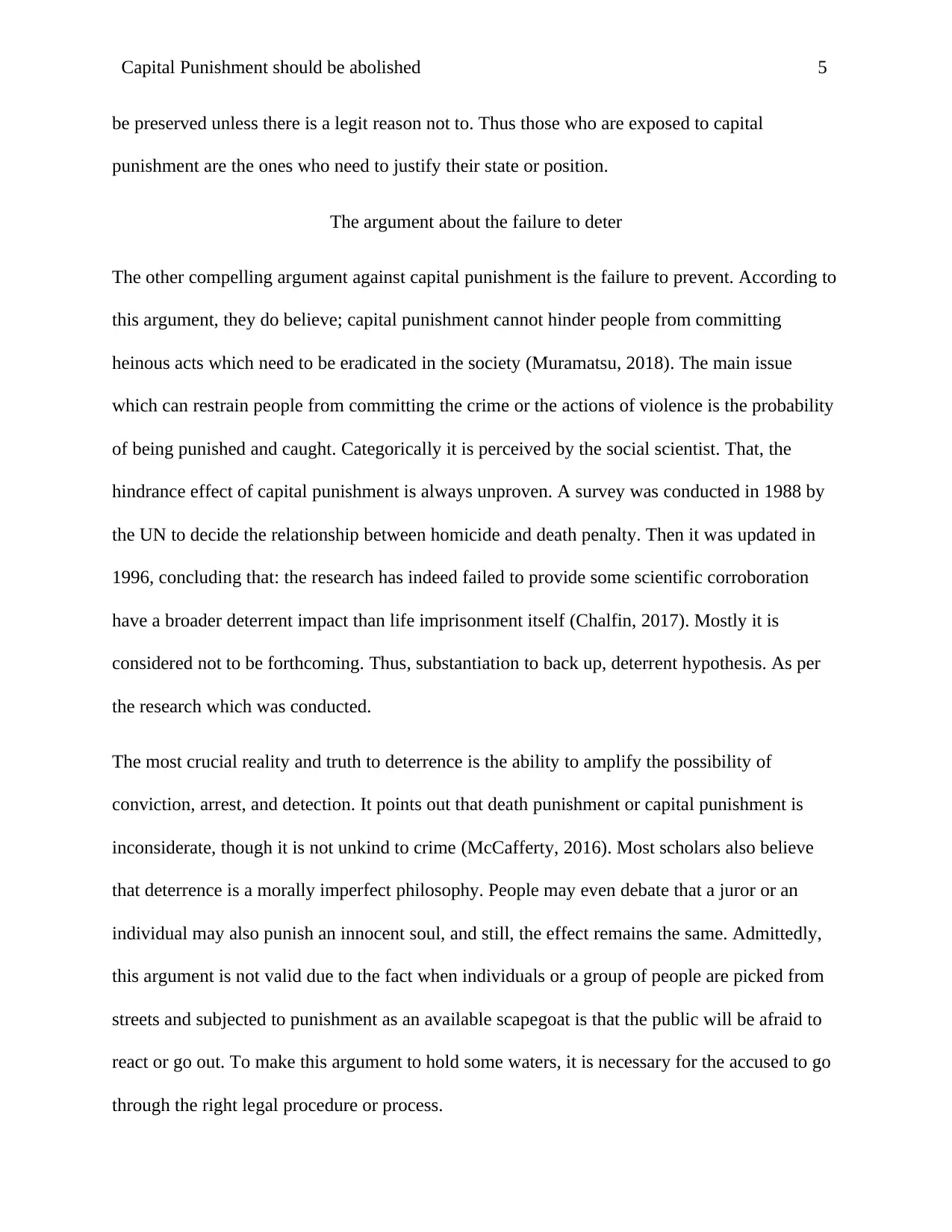
Capital Punishment should be abolished 5
be preserved unless there is a legit reason not to. Thus those who are exposed to capital
punishment are the ones who need to justify their state or position.
The argument about the failure to deter
The other compelling argument against capital punishment is the failure to prevent. According to
this argument, they do believe; capital punishment cannot hinder people from committing
heinous acts which need to be eradicated in the society (Muramatsu, 2018). The main issue
which can restrain people from committing the crime or the actions of violence is the probability
of being punished and caught. Categorically it is perceived by the social scientist. That, the
hindrance effect of capital punishment is always unproven. A survey was conducted in 1988 by
the UN to decide the relationship between homicide and death penalty. Then it was updated in
1996, concluding that: the research has indeed failed to provide some scientific corroboration
have a broader deterrent impact than life imprisonment itself (Chalfin, 2017). Mostly it is
considered not to be forthcoming. Thus, substantiation to back up, deterrent hypothesis. As per
the research which was conducted.
The most crucial reality and truth to deterrence is the ability to amplify the possibility of
conviction, arrest, and detection. It points out that death punishment or capital punishment is
inconsiderate, though it is not unkind to crime (McCafferty, 2016). Most scholars also believe
that deterrence is a morally imperfect philosophy. People may even debate that a juror or an
individual may also punish an innocent soul, and still, the effect remains the same. Admittedly,
this argument is not valid due to the fact when individuals or a group of people are picked from
streets and subjected to punishment as an available scapegoat is that the public will be afraid to
react or go out. To make this argument to hold some waters, it is necessary for the accused to go
through the right legal procedure or process.
be preserved unless there is a legit reason not to. Thus those who are exposed to capital
punishment are the ones who need to justify their state or position.
The argument about the failure to deter
The other compelling argument against capital punishment is the failure to prevent. According to
this argument, they do believe; capital punishment cannot hinder people from committing
heinous acts which need to be eradicated in the society (Muramatsu, 2018). The main issue
which can restrain people from committing the crime or the actions of violence is the probability
of being punished and caught. Categorically it is perceived by the social scientist. That, the
hindrance effect of capital punishment is always unproven. A survey was conducted in 1988 by
the UN to decide the relationship between homicide and death penalty. Then it was updated in
1996, concluding that: the research has indeed failed to provide some scientific corroboration
have a broader deterrent impact than life imprisonment itself (Chalfin, 2017). Mostly it is
considered not to be forthcoming. Thus, substantiation to back up, deterrent hypothesis. As per
the research which was conducted.
The most crucial reality and truth to deterrence is the ability to amplify the possibility of
conviction, arrest, and detection. It points out that death punishment or capital punishment is
inconsiderate, though it is not unkind to crime (McCafferty, 2016). Most scholars also believe
that deterrence is a morally imperfect philosophy. People may even debate that a juror or an
individual may also punish an innocent soul, and still, the effect remains the same. Admittedly,
this argument is not valid due to the fact when individuals or a group of people are picked from
streets and subjected to punishment as an available scapegoat is that the public will be afraid to
react or go out. To make this argument to hold some waters, it is necessary for the accused to go
through the right legal procedure or process.
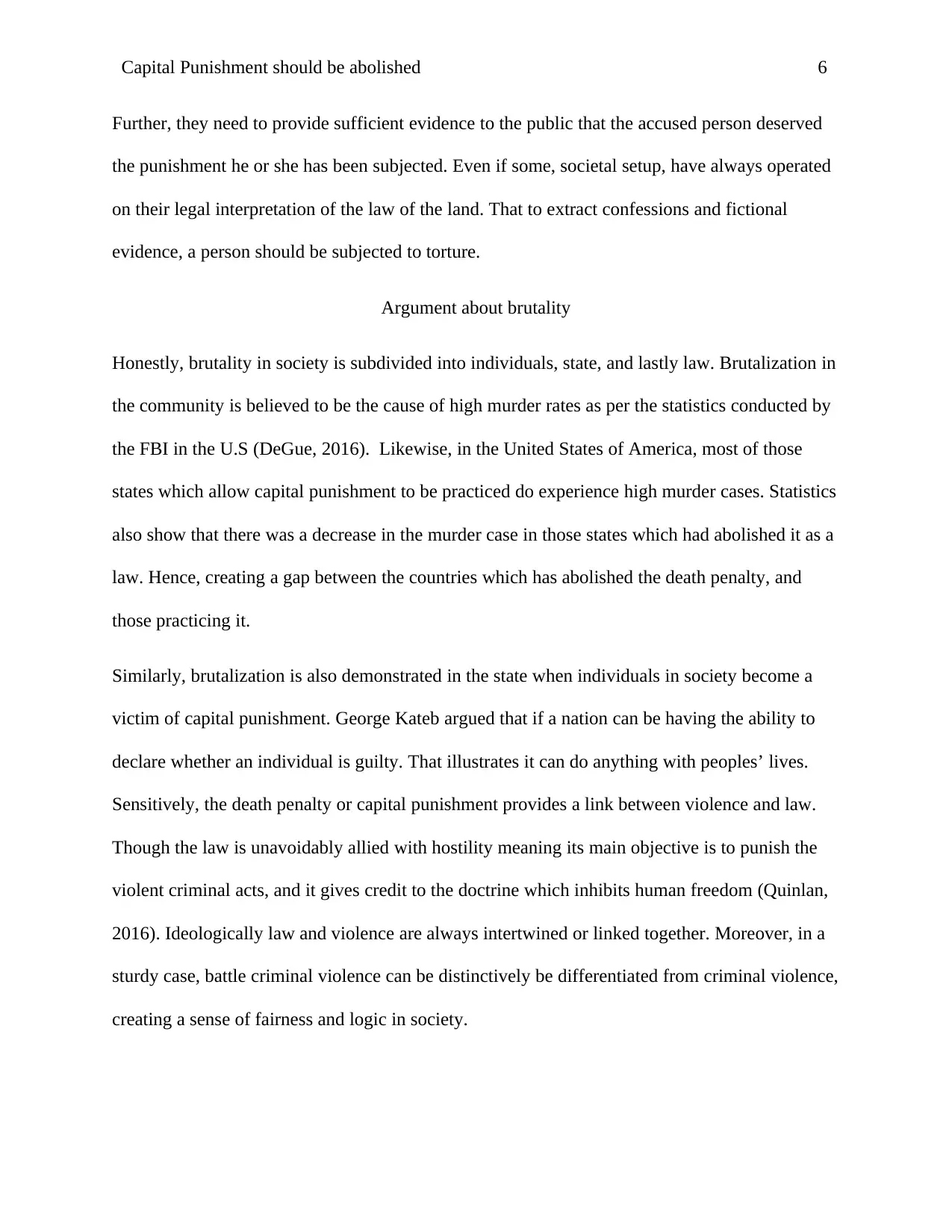
Capital Punishment should be abolished 6
Further, they need to provide sufficient evidence to the public that the accused person deserved
the punishment he or she has been subjected. Even if some, societal setup, have always operated
on their legal interpretation of the law of the land. That to extract confessions and fictional
evidence, a person should be subjected to torture.
Argument about brutality
Honestly, brutality in society is subdivided into individuals, state, and lastly law. Brutalization in
the community is believed to be the cause of high murder rates as per the statistics conducted by
the FBI in the U.S (DeGue, 2016). Likewise, in the United States of America, most of those
states which allow capital punishment to be practiced do experience high murder cases. Statistics
also show that there was a decrease in the murder case in those states which had abolished it as a
law. Hence, creating a gap between the countries which has abolished the death penalty, and
those practicing it.
Similarly, brutalization is also demonstrated in the state when individuals in society become a
victim of capital punishment. George Kateb argued that if a nation can be having the ability to
declare whether an individual is guilty. That illustrates it can do anything with peoples’ lives.
Sensitively, the death penalty or capital punishment provides a link between violence and law.
Though the law is unavoidably allied with hostility meaning its main objective is to punish the
violent criminal acts, and it gives credit to the doctrine which inhibits human freedom (Quinlan,
2016). Ideologically law and violence are always intertwined or linked together. Moreover, in a
sturdy case, battle criminal violence can be distinctively be differentiated from criminal violence,
creating a sense of fairness and logic in society.
Further, they need to provide sufficient evidence to the public that the accused person deserved
the punishment he or she has been subjected. Even if some, societal setup, have always operated
on their legal interpretation of the law of the land. That to extract confessions and fictional
evidence, a person should be subjected to torture.
Argument about brutality
Honestly, brutality in society is subdivided into individuals, state, and lastly law. Brutalization in
the community is believed to be the cause of high murder rates as per the statistics conducted by
the FBI in the U.S (DeGue, 2016). Likewise, in the United States of America, most of those
states which allow capital punishment to be practiced do experience high murder cases. Statistics
also show that there was a decrease in the murder case in those states which had abolished it as a
law. Hence, creating a gap between the countries which has abolished the death penalty, and
those practicing it.
Similarly, brutalization is also demonstrated in the state when individuals in society become a
victim of capital punishment. George Kateb argued that if a nation can be having the ability to
declare whether an individual is guilty. That illustrates it can do anything with peoples’ lives.
Sensitively, the death penalty or capital punishment provides a link between violence and law.
Though the law is unavoidably allied with hostility meaning its main objective is to punish the
violent criminal acts, and it gives credit to the doctrine which inhibits human freedom (Quinlan,
2016). Ideologically law and violence are always intertwined or linked together. Moreover, in a
sturdy case, battle criminal violence can be distinctively be differentiated from criminal violence,
creating a sense of fairness and logic in society.
⊘ This is a preview!⊘
Do you want full access?
Subscribe today to unlock all pages.

Trusted by 1+ million students worldwide
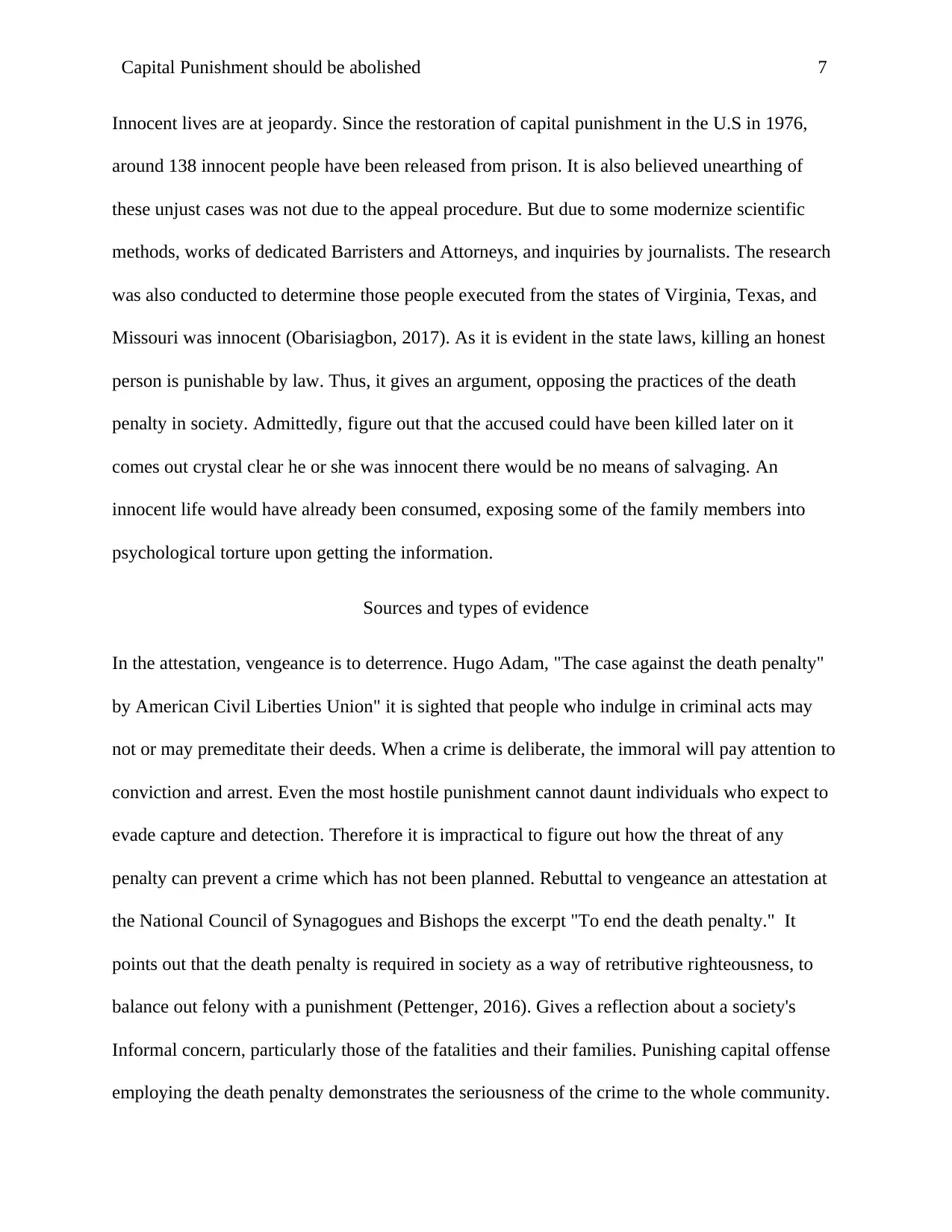
Capital Punishment should be abolished 7
Innocent lives are at jeopardy. Since the restoration of capital punishment in the U.S in 1976,
around 138 innocent people have been released from prison. It is also believed unearthing of
these unjust cases was not due to the appeal procedure. But due to some modernize scientific
methods, works of dedicated Barristers and Attorneys, and inquiries by journalists. The research
was also conducted to determine those people executed from the states of Virginia, Texas, and
Missouri was innocent (Obarisiagbon, 2017). As it is evident in the state laws, killing an honest
person is punishable by law. Thus, it gives an argument, opposing the practices of the death
penalty in society. Admittedly, figure out that the accused could have been killed later on it
comes out crystal clear he or she was innocent there would be no means of salvaging. An
innocent life would have already been consumed, exposing some of the family members into
psychological torture upon getting the information.
Sources and types of evidence
In the attestation, vengeance is to deterrence. Hugo Adam, "The case against the death penalty"
by American Civil Liberties Union" it is sighted that people who indulge in criminal acts may
not or may premeditate their deeds. When a crime is deliberate, the immoral will pay attention to
conviction and arrest. Even the most hostile punishment cannot daunt individuals who expect to
evade capture and detection. Therefore it is impractical to figure out how the threat of any
penalty can prevent a crime which has not been planned. Rebuttal to vengeance an attestation at
the National Council of Synagogues and Bishops the excerpt "To end the death penalty." It
points out that the death penalty is required in society as a way of retributive righteousness, to
balance out felony with a punishment (Pettenger, 2016). Gives a reflection about a society's
Informal concern, particularly those of the fatalities and their families. Punishing capital offense
employing the death penalty demonstrates the seriousness of the crime to the whole community.
Innocent lives are at jeopardy. Since the restoration of capital punishment in the U.S in 1976,
around 138 innocent people have been released from prison. It is also believed unearthing of
these unjust cases was not due to the appeal procedure. But due to some modernize scientific
methods, works of dedicated Barristers and Attorneys, and inquiries by journalists. The research
was also conducted to determine those people executed from the states of Virginia, Texas, and
Missouri was innocent (Obarisiagbon, 2017). As it is evident in the state laws, killing an honest
person is punishable by law. Thus, it gives an argument, opposing the practices of the death
penalty in society. Admittedly, figure out that the accused could have been killed later on it
comes out crystal clear he or she was innocent there would be no means of salvaging. An
innocent life would have already been consumed, exposing some of the family members into
psychological torture upon getting the information.
Sources and types of evidence
In the attestation, vengeance is to deterrence. Hugo Adam, "The case against the death penalty"
by American Civil Liberties Union" it is sighted that people who indulge in criminal acts may
not or may premeditate their deeds. When a crime is deliberate, the immoral will pay attention to
conviction and arrest. Even the most hostile punishment cannot daunt individuals who expect to
evade capture and detection. Therefore it is impractical to figure out how the threat of any
penalty can prevent a crime which has not been planned. Rebuttal to vengeance an attestation at
the National Council of Synagogues and Bishops the excerpt "To end the death penalty." It
points out that the death penalty is required in society as a way of retributive righteousness, to
balance out felony with a punishment (Pettenger, 2016). Gives a reflection about a society's
Informal concern, particularly those of the fatalities and their families. Punishing capital offense
employing the death penalty demonstrates the seriousness of the crime to the whole community.
Paraphrase This Document
Need a fresh take? Get an instant paraphrase of this document with our AI Paraphraser
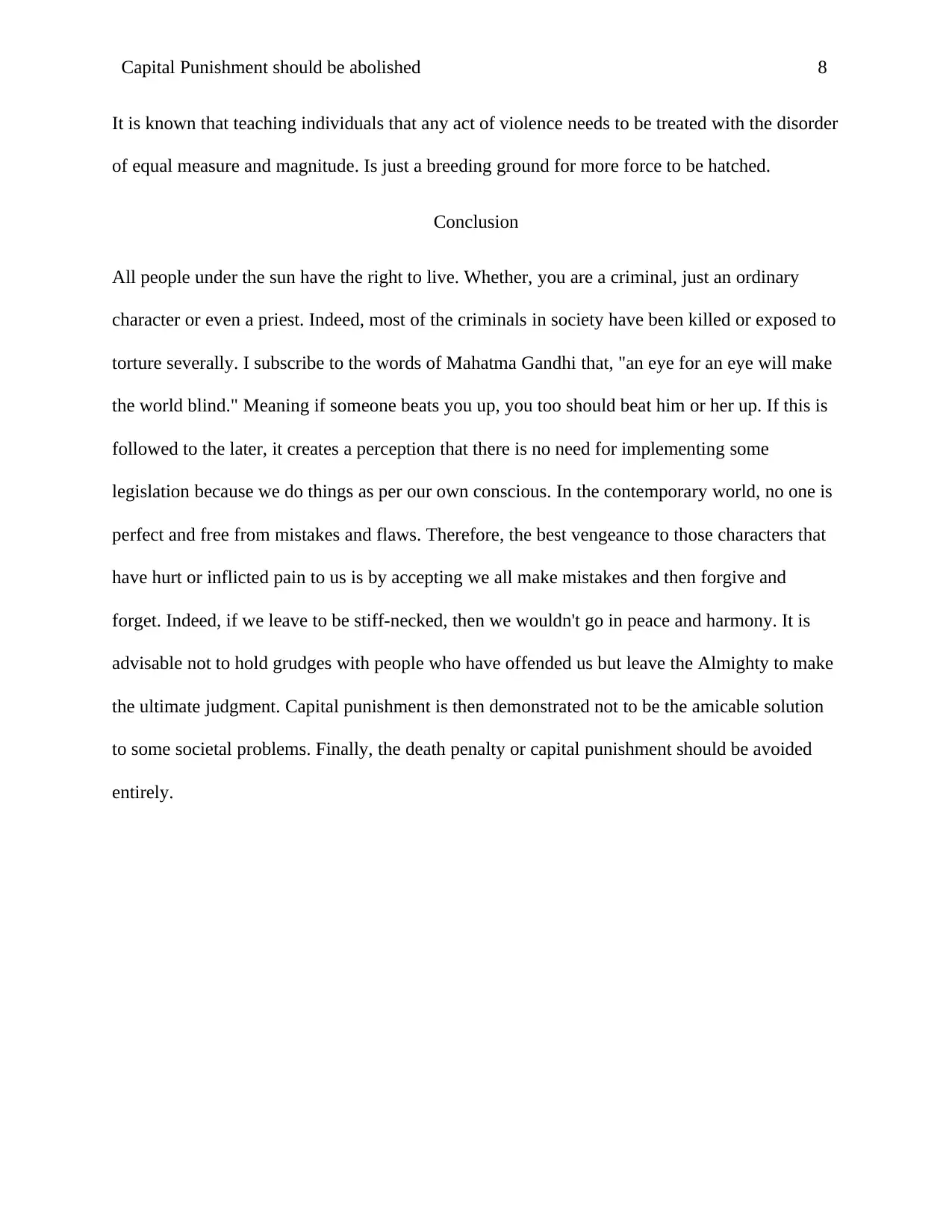
Capital Punishment should be abolished 8
It is known that teaching individuals that any act of violence needs to be treated with the disorder
of equal measure and magnitude. Is just a breeding ground for more force to be hatched.
Conclusion
All people under the sun have the right to live. Whether, you are a criminal, just an ordinary
character or even a priest. Indeed, most of the criminals in society have been killed or exposed to
torture severally. I subscribe to the words of Mahatma Gandhi that, "an eye for an eye will make
the world blind." Meaning if someone beats you up, you too should beat him or her up. If this is
followed to the later, it creates a perception that there is no need for implementing some
legislation because we do things as per our own conscious. In the contemporary world, no one is
perfect and free from mistakes and flaws. Therefore, the best vengeance to those characters that
have hurt or inflicted pain to us is by accepting we all make mistakes and then forgive and
forget. Indeed, if we leave to be stiff-necked, then we wouldn't go in peace and harmony. It is
advisable not to hold grudges with people who have offended us but leave the Almighty to make
the ultimate judgment. Capital punishment is then demonstrated not to be the amicable solution
to some societal problems. Finally, the death penalty or capital punishment should be avoided
entirely.
It is known that teaching individuals that any act of violence needs to be treated with the disorder
of equal measure and magnitude. Is just a breeding ground for more force to be hatched.
Conclusion
All people under the sun have the right to live. Whether, you are a criminal, just an ordinary
character or even a priest. Indeed, most of the criminals in society have been killed or exposed to
torture severally. I subscribe to the words of Mahatma Gandhi that, "an eye for an eye will make
the world blind." Meaning if someone beats you up, you too should beat him or her up. If this is
followed to the later, it creates a perception that there is no need for implementing some
legislation because we do things as per our own conscious. In the contemporary world, no one is
perfect and free from mistakes and flaws. Therefore, the best vengeance to those characters that
have hurt or inflicted pain to us is by accepting we all make mistakes and then forgive and
forget. Indeed, if we leave to be stiff-necked, then we wouldn't go in peace and harmony. It is
advisable not to hold grudges with people who have offended us but leave the Almighty to make
the ultimate judgment. Capital punishment is then demonstrated not to be the amicable solution
to some societal problems. Finally, the death penalty or capital punishment should be avoided
entirely.
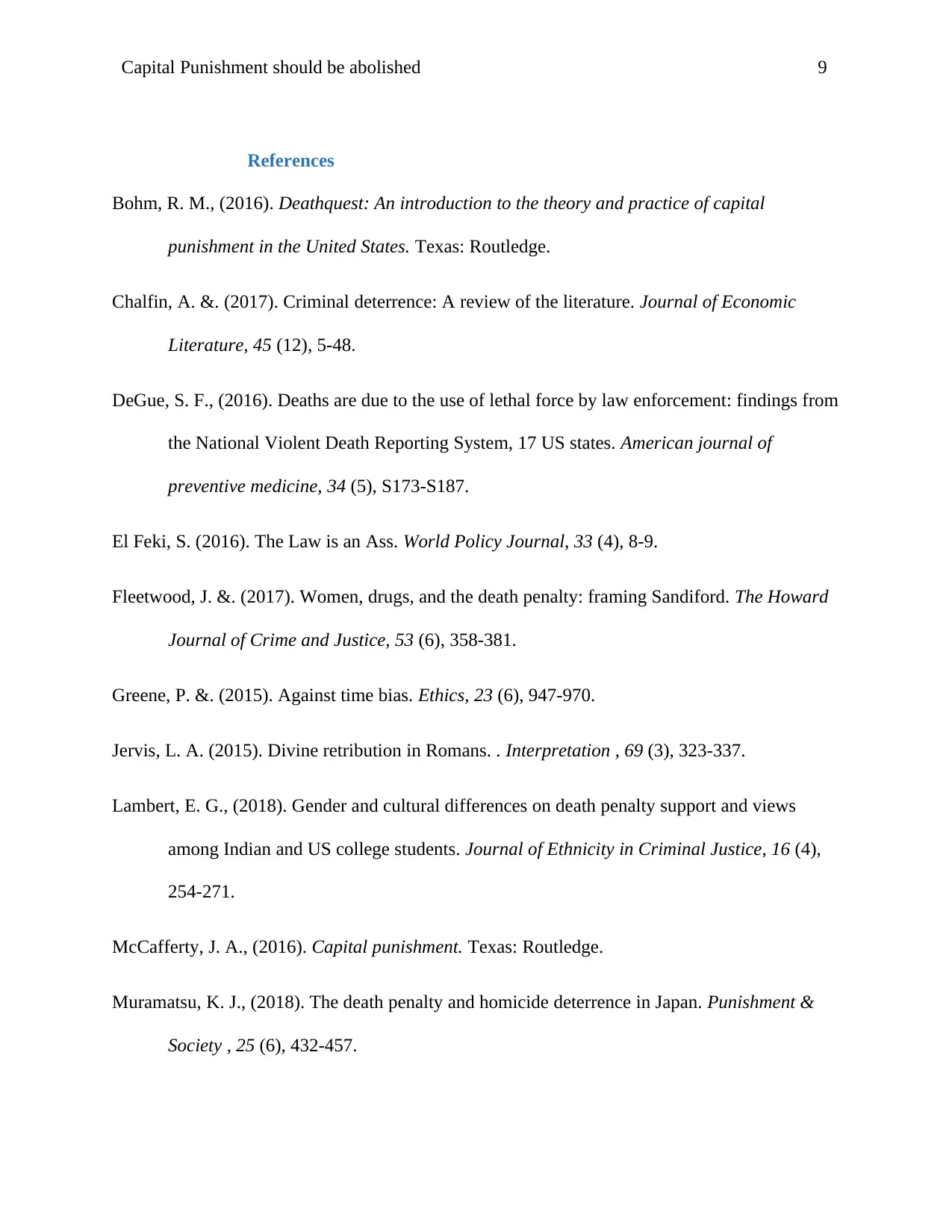
Capital Punishment should be abolished 9
References
Bohm, R. M., (2016). Deathquest: An introduction to the theory and practice of capital
punishment in the United States. Texas: Routledge.
Chalfin, A. &. (2017). Criminal deterrence: A review of the literature. Journal of Economic
Literature, 45 (12), 5-48.
DeGue, S. F., (2016). Deaths are due to the use of lethal force by law enforcement: findings from
the National Violent Death Reporting System, 17 US states. American journal of
preventive medicine, 34 (5), S173-S187.
El Feki, S. (2016). The Law is an Ass. World Policy Journal, 33 (4), 8-9.
Fleetwood, J. &. (2017). Women, drugs, and the death penalty: framing Sandiford. The Howard
Journal of Crime and Justice, 53 (6), 358-381.
Greene, P. &. (2015). Against time bias. Ethics, 23 (6), 947-970.
Jervis, L. A. (2015). Divine retribution in Romans. . Interpretation , 69 (3), 323-337.
Lambert, E. G., (2018). Gender and cultural differences on death penalty support and views
among Indian and US college students. Journal of Ethnicity in Criminal Justice, 16 (4),
254-271.
McCafferty, J. A., (2016). Capital punishment. Texas: Routledge.
Muramatsu, K. J., (2018). The death penalty and homicide deterrence in Japan. Punishment &
Society , 25 (6), 432-457.
References
Bohm, R. M., (2016). Deathquest: An introduction to the theory and practice of capital
punishment in the United States. Texas: Routledge.
Chalfin, A. &. (2017). Criminal deterrence: A review of the literature. Journal of Economic
Literature, 45 (12), 5-48.
DeGue, S. F., (2016). Deaths are due to the use of lethal force by law enforcement: findings from
the National Violent Death Reporting System, 17 US states. American journal of
preventive medicine, 34 (5), S173-S187.
El Feki, S. (2016). The Law is an Ass. World Policy Journal, 33 (4), 8-9.
Fleetwood, J. &. (2017). Women, drugs, and the death penalty: framing Sandiford. The Howard
Journal of Crime and Justice, 53 (6), 358-381.
Greene, P. &. (2015). Against time bias. Ethics, 23 (6), 947-970.
Jervis, L. A. (2015). Divine retribution in Romans. . Interpretation , 69 (3), 323-337.
Lambert, E. G., (2018). Gender and cultural differences on death penalty support and views
among Indian and US college students. Journal of Ethnicity in Criminal Justice, 16 (4),
254-271.
McCafferty, J. A., (2016). Capital punishment. Texas: Routledge.
Muramatsu, K. J., (2018). The death penalty and homicide deterrence in Japan. Punishment &
Society , 25 (6), 432-457.
⊘ This is a preview!⊘
Do you want full access?
Subscribe today to unlock all pages.

Trusted by 1+ million students worldwide
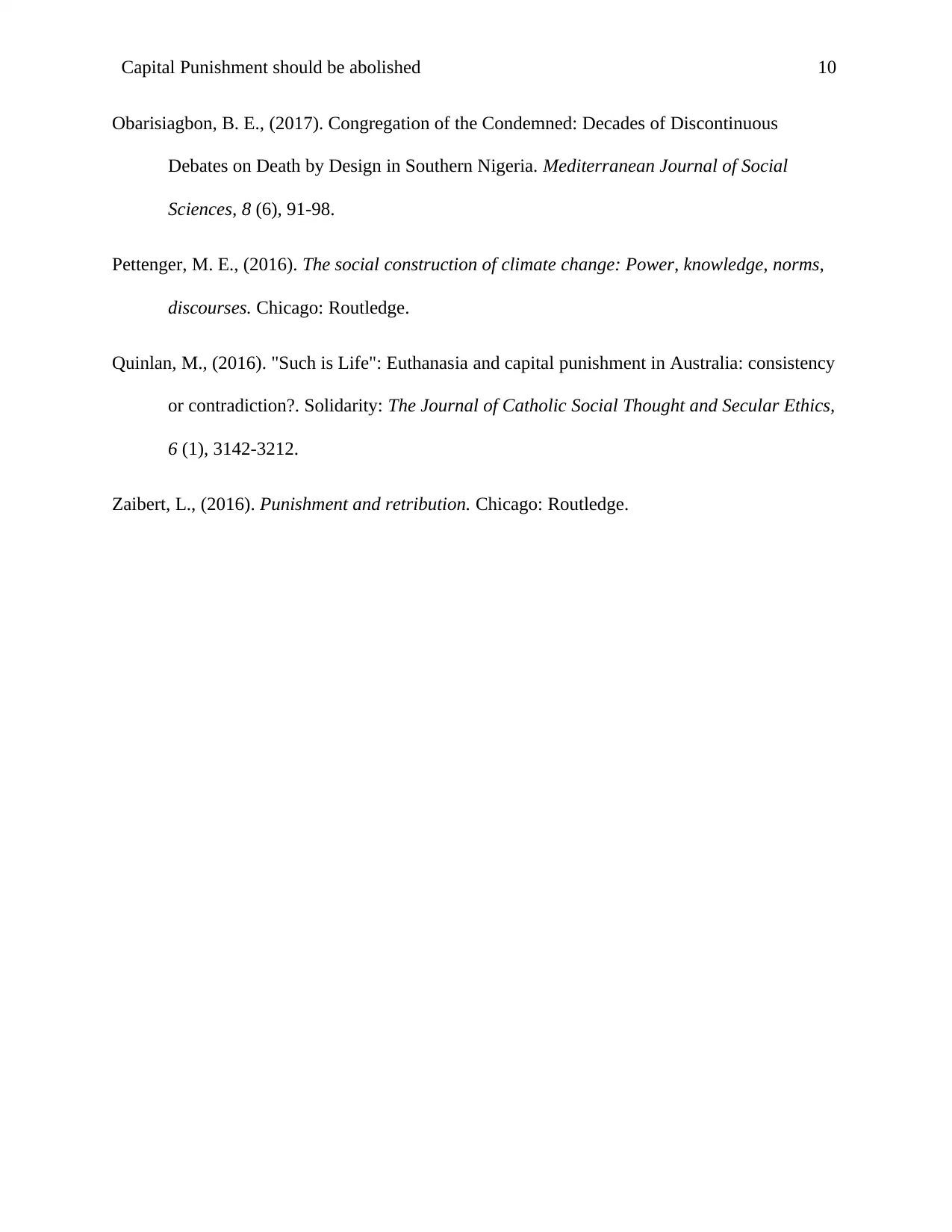
Capital Punishment should be abolished 10
Obarisiagbon, B. E., (2017). Congregation of the Condemned: Decades of Discontinuous
Debates on Death by Design in Southern Nigeria. Mediterranean Journal of Social
Sciences, 8 (6), 91-98.
Pettenger, M. E., (2016). The social construction of climate change: Power, knowledge, norms,
discourses. Chicago: Routledge.
Quinlan, M., (2016). "Such is Life": Euthanasia and capital punishment in Australia: consistency
or contradiction?. Solidarity: The Journal of Catholic Social Thought and Secular Ethics,
6 (1), 3142-3212.
Zaibert, L., (2016). Punishment and retribution. Chicago: Routledge.
Obarisiagbon, B. E., (2017). Congregation of the Condemned: Decades of Discontinuous
Debates on Death by Design in Southern Nigeria. Mediterranean Journal of Social
Sciences, 8 (6), 91-98.
Pettenger, M. E., (2016). The social construction of climate change: Power, knowledge, norms,
discourses. Chicago: Routledge.
Quinlan, M., (2016). "Such is Life": Euthanasia and capital punishment in Australia: consistency
or contradiction?. Solidarity: The Journal of Catholic Social Thought and Secular Ethics,
6 (1), 3142-3212.
Zaibert, L., (2016). Punishment and retribution. Chicago: Routledge.
Paraphrase This Document
Need a fresh take? Get an instant paraphrase of this document with our AI Paraphraser
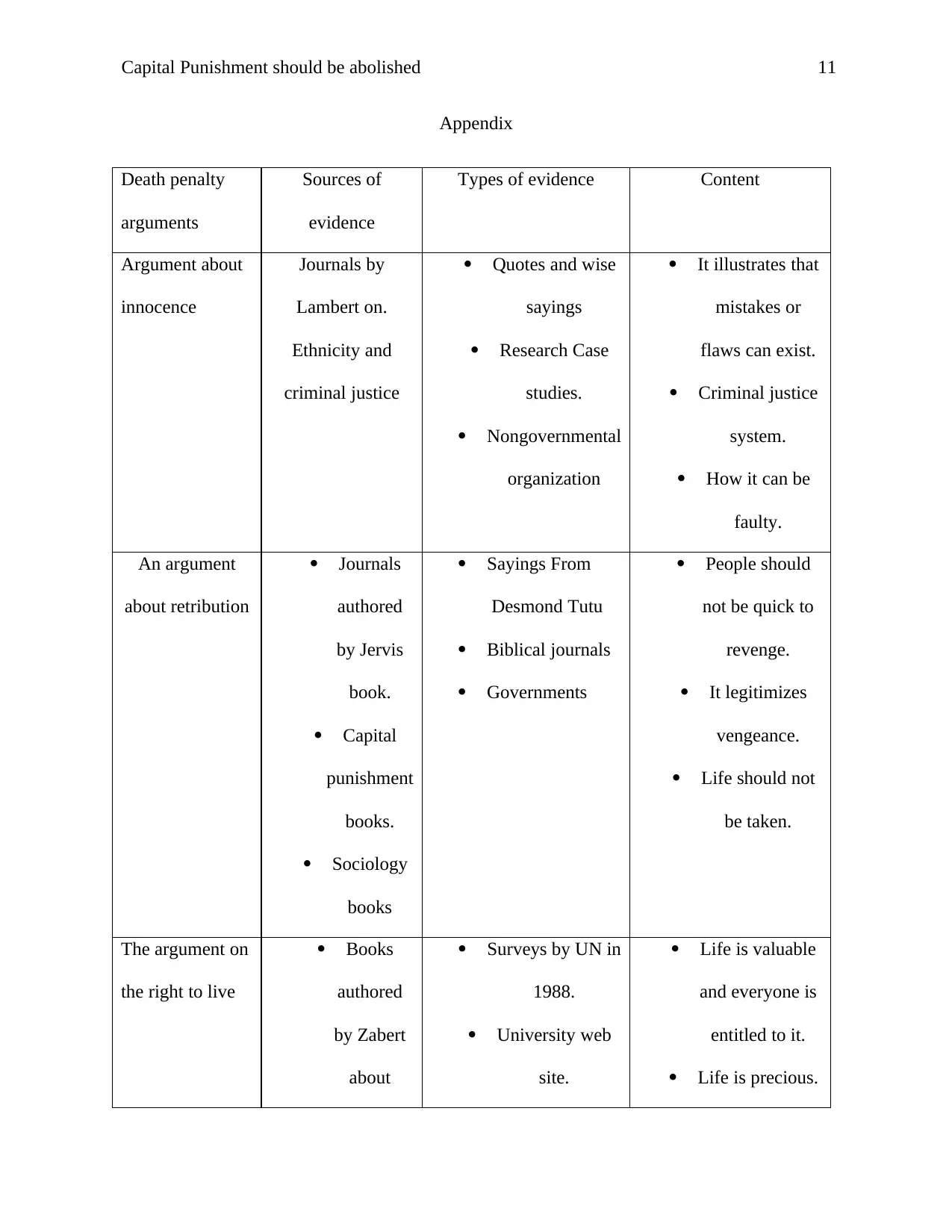
Capital Punishment should be abolished 11
Appendix
Death penalty
arguments
Sources of
evidence
Types of evidence Content
Argument about
innocence
Journals by
Lambert on.
Ethnicity and
criminal justice
Quotes and wise
sayings
Research Case
studies.
Nongovernmental
organization
It illustrates that
mistakes or
flaws can exist.
Criminal justice
system.
How it can be
faulty.
An argument
about retribution
Journals
authored
by Jervis
book.
Capital
punishment
books.
Sociology
books
Sayings From
Desmond Tutu
Biblical journals
Governments
People should
not be quick to
revenge.
It legitimizes
vengeance.
Life should not
be taken.
The argument on
the right to live
Books
authored
by Zabert
about
Surveys by UN in
1988.
University web
site.
Life is valuable
and everyone is
entitled to it.
Life is precious.
Appendix
Death penalty
arguments
Sources of
evidence
Types of evidence Content
Argument about
innocence
Journals by
Lambert on.
Ethnicity and
criminal justice
Quotes and wise
sayings
Research Case
studies.
Nongovernmental
organization
It illustrates that
mistakes or
flaws can exist.
Criminal justice
system.
How it can be
faulty.
An argument
about retribution
Journals
authored
by Jervis
book.
Capital
punishment
books.
Sociology
books
Sayings From
Desmond Tutu
Biblical journals
Governments
People should
not be quick to
revenge.
It legitimizes
vengeance.
Life should not
be taken.
The argument on
the right to live
Books
authored
by Zabert
about
Surveys by UN in
1988.
University web
site.
Life is valuable
and everyone is
entitled to it.
Life is precious.
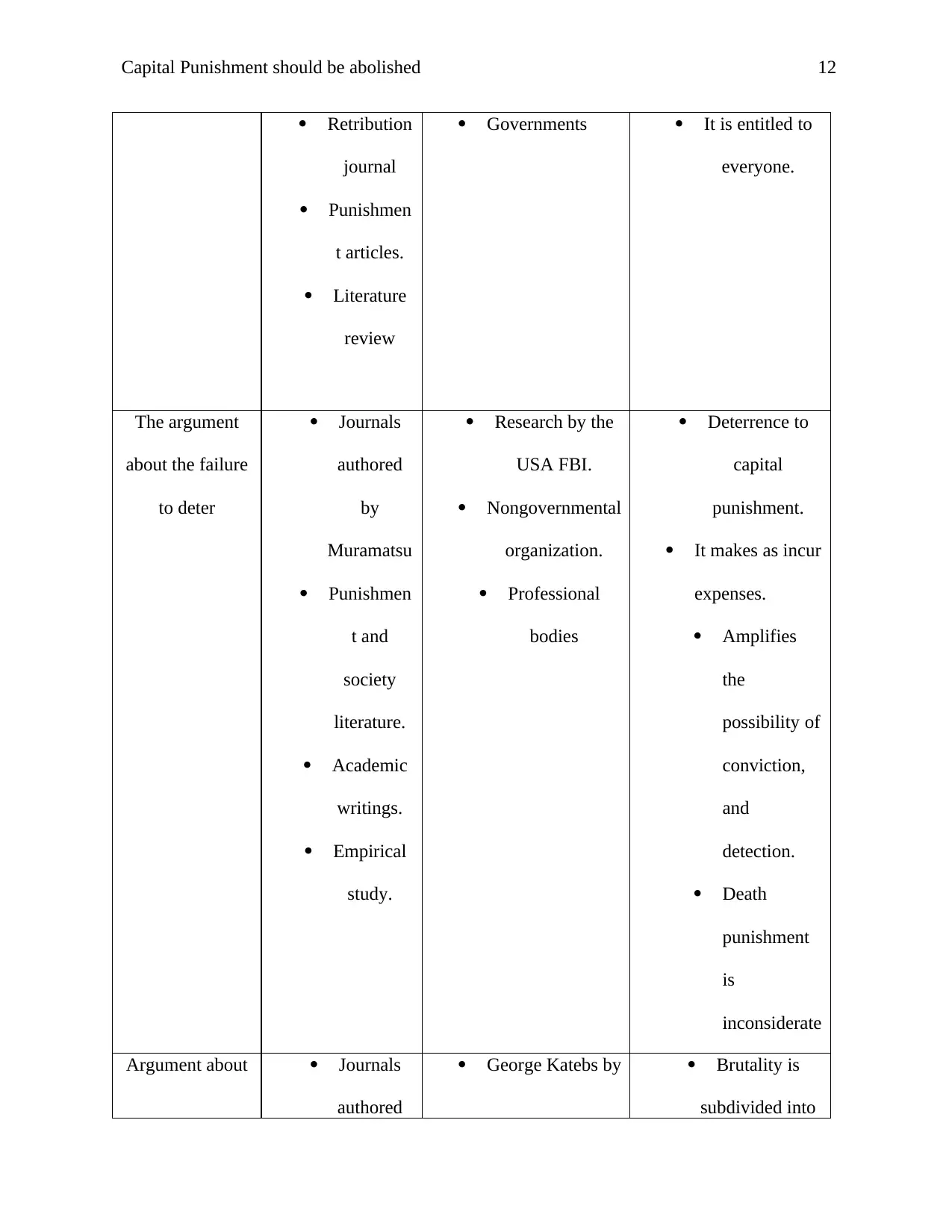
Capital Punishment should be abolished 12
Retribution
journal
Punishmen
t articles.
Literature
review
Governments It is entitled to
everyone.
The argument
about the failure
to deter
Journals
authored
by
Muramatsu
Punishmen
t and
society
literature.
Academic
writings.
Empirical
study.
Research by the
USA FBI.
Nongovernmental
organization.
Professional
bodies
Deterrence to
capital
punishment.
It makes as incur
expenses.
Amplifies
the
possibility of
conviction,
and
detection.
Death
punishment
is
inconsiderate
Argument about Journals
authored
George Katebs by Brutality is
subdivided into
Retribution
journal
Punishmen
t articles.
Literature
review
Governments It is entitled to
everyone.
The argument
about the failure
to deter
Journals
authored
by
Muramatsu
Punishmen
t and
society
literature.
Academic
writings.
Empirical
study.
Research by the
USA FBI.
Nongovernmental
organization.
Professional
bodies
Deterrence to
capital
punishment.
It makes as incur
expenses.
Amplifies
the
possibility of
conviction,
and
detection.
Death
punishment
is
inconsiderate
Argument about Journals
authored
George Katebs by Brutality is
subdivided into
⊘ This is a preview!⊘
Do you want full access?
Subscribe today to unlock all pages.

Trusted by 1+ million students worldwide
1 out of 13
Related Documents
Your All-in-One AI-Powered Toolkit for Academic Success.
+13062052269
info@desklib.com
Available 24*7 on WhatsApp / Email
![[object Object]](/_next/static/media/star-bottom.7253800d.svg)
Unlock your academic potential
Copyright © 2020–2026 A2Z Services. All Rights Reserved. Developed and managed by ZUCOL.





